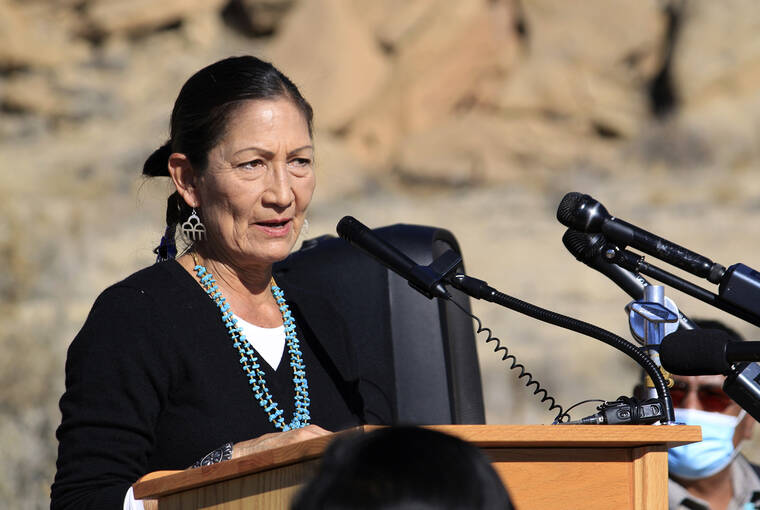Biden sets out oil, gas leasing reform, stops short of ban

U.S. Interior Secretary Deb Haaland addresses a crowd Monday during a celebration at Chaco Culture National Historical Park in northwestern New Mexico. (AP Photo/Susan Montoya Bryan)
WASHINGTON — The Biden administration on Friday recommended an overhaul of the nation’s oil and gas leasing program to limit areas available for energy development and raise costs for oil and gas companies to drill on public land and water.
WASHINGTON — The Biden administration on Friday recommended an overhaul of the nation’s oil and gas leasing program to limit areas available for energy development and raise costs for oil and gas companies to drill on public land and water.
The long-awaited report by the Interior Department stops short of recommending an end to oil and gas leasing on public lands, as many environmental groups have urged. But officials said the report would lead to a more responsible leasing process that provides a better return to U.S. taxpayers.
ADVERTISING
“Our nation faces a profound climate crisis that is impacting every American,” Interior Secretary Deb Haaland said in a statement, adding that the new report’s recommendations will mitigate worsening climate change impacts “while staying steadfast in the pursuit of environmental justice.”
The report completes a review ordered in January by President Joe Biden, who directed a pause in federal oil and gas lease sales in his first days in office, citing worries about climate change.
The moratorium drew sharp criticism from congressional Republicans and the oil industry, even as many environmentalists and Democrats said Biden should make the leasing pause permanent.
The new report seeks a middle ground that would continue the multibillion-dollar leasing program while reforming it to end what many officials consider overly favorable terms for the industry.
The report recommends hiking federal royalty rates for oil and gas drilling, which have not been raised for 100 years. The federal rate of 12.5% that developers must pay to drill on public lands is significantly lower than many states and private landowners charge for drilling leases on state or private lands.
The report also said the government should consider raising bond payments that energy companies must set aside for future cleanup before they drill new wells. Bond rates have not been increased in decades, the report said.
The Bureau of Land Management, an Interior Department agency, should focus leasing offers on areas that have moderate to high potential for oil and gas resources and are close to existing oil and gas infrastructure, the report said.
The White House declined to comment Friday, referring questions to Interior.
The federal leasing program has drawn renewed focus in recent weeks as gasoline prices have skyrocketed and Republicans complained that Biden policies, including the leasing moratorium, rejection of the Keystone XL oil pipeline and a ban on oil leasing in Alaska’s Arctic National Wildlife Refuge, contributed to the price spike.
Biden on Tuesday ordered a record 50 million barrels of oil released from America’s strategic reserve, aiming to bring down gas prices amid concerns about inflation. Gasoline prices are at about $3.40 a gallon, more than 50% higher than a year ago, according to the American Automobile Association.
Oil prices dropped about 13% Friday as a new coronavirus variant first detected in South Africa appeared to be spreading across the globe.
The Biden administration conducted a lease sale on federal oil and gas reserves in the Gulf of Mexico last week, after attorneys general from Republican-led states successfully sued in federal court to lift the suspension on federal oil and gas sales that Biden imposed when he took office.
Energy companies including Shell, BP, Chevron and ExxonMobil offered a combined $192 million for offshore drilling rights in the Gulf, highlighting the hurdles Biden faces to reach climate goals dependent on deep cuts in fossil fuel emissions.
The leases will take years to develop, meaning oil companies could keep producing crude long past 2030, when Biden has set a goal to lower greenhouse gas emissions by at least 50%, compared with 2005 levels. Scientists say the world needs to be well on the way to that goal over the next decade to avoid catastrophic climate change.
Yet even as Biden has tried to cajole other world leaders into strengthening efforts against global warming, including at this month’s U.N. climate talks in Scotland, he’s had difficulty gaining ground on climate issues at home.
The administration has proposed another round of oil and gas sales early next year in Wyoming, Colorado, Montana and other states. Interior Department officials proceeded despite concluding that burning the fuels could lead to billions of dollars in potential future climate damages.
Emissions from burning and extracting fossil fuels from public lands and waters account for about a quarter of U.S. carbon dioxide emissions, according to the U.S. Geological Survey.
Environmentalists hailed the report’s recommendation to raise royalty rates, but some groups said the report falls short of action needed to address the climate crisis.
“Today’s report is a complete failure of the climate leadership that our world desperately needs,” said Taylor McKinnon of the Center for Biological Diversity, an environmental group.


